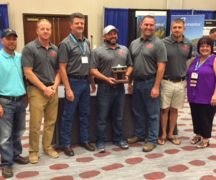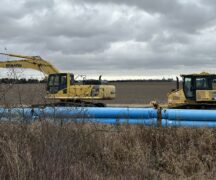From NORTHWESTERN WATER & SEWER DISTRICT
Freezing temperatures can damage water pipes in homes and water distribution networks. The Northwestern Water and Sewer District offers the following guidelines to prepare for and prevent frozen waterlines:
Prepare Before It gets Cold:
- Locate and label your water shutoff valve, typically found near the water meter or where the water line enters your house. Everyone in the house should know how to turn it off in case of emergency.
- Turn off the water to outside faucets, remove hoses and drain the pipes. Use a tap cover to insulate the spigot.
- Cover any open vents inside your home with insulation, plastic, or cardboard.
During Extreme Cold:
- Open cabinet doors on colder nights to let the warm air reach the pipes.
- Keep the temperature where water meters and interior pipes are located at least 55 degrees.
- Let your kitchen or bathroom faucets drip slowly on very cold nights to prevent the water from freezing.
- Be ready: Store water for your household in advance. The rule of thumb is to store one-to-two gallons per person, per day, for at least three days. Don’t forget to store water for your pets!
Remember: Pipe insulation only works if your home is heated. You can find the materials you need to insulate your pipes at your local hardware or plumbing store.
What to do if a pipe freezes:
- Shut off the water right away. Don’t try to thaw frozen pipes unless the water is off. The pipes or joints might have cracks you can’t see.
- Open the cold and/or hot water faucet nearest to the frozen pipe. This will lower the pressure and reduce the risk of breakage.
- Heat the frozen pipe by warming the air around it, or by applying heat directly to it. You can use a hair dryer, space heater or hot water. Don’t leave space heaters unattended.
- Don’t use kerosene heaters or open flames to thaw pipes inside your home.
- After the pipes have thawed, turn the water back on slowly and check for cracks and leaks.
- If you are not sure what to do, call a registered plumber for help.
If you are leaving for your home for a short time:
- Keep the temperature where water meters and interior pipes are located at least 55 degrees
- Ask a trustworthy neighbor to check your property every day.
- Sign up for leak alerts on Aqua Hawk, a free service for District customers that can alert you when your water use spikes and allows you to monitor your water use online.
Because we operate 24/7/365, we always have staff on call for after-hours emergencies. Contact your county sheriff’s department to dispatch a water operator.
- Wood County: (419) 354 – 9001 (select option #9)
- McComb: (419) 422 – 2424
- Henry County: (419) 592 – 8010





